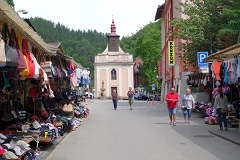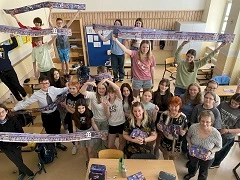Weekly review no. 31
03.05.2024
Hřensko's new mayor wants to close border huts

The border town of Hřensko will be run by women in the future. Kateřina Horáková was elected as the new mayor on Monday. Her deputy, Alena Pačáková, is also a woman. Horáková succeeds Zdeněk Pánek, who resigned at the end of the year and was mayor of the municipality for many years. Pačáková replaces the previous deputy Robert Mareš, who had temporarily led the municipality since the end of the year and has now resigned not only as deputy mayor but also as municipal representative.
Horáková takes over the office at a difficult time. For years, Hřensko was able to rely on a buoyant income from the operation of boat trips in the Edmund Gorge. But since the major forest fire in the summer of 2022, the gorge has been closed due to the risk of trees breaking. As a result, Hřensko has already had to lay off employees. Only the smaller Wild Gorge, which is more difficult to reach, remains open for tourist boat trips. It is not possible to say when the Edmund Gorge will open. A few weeks ago, the national park announced that it would remain closed for at least another three years.
The first goal for the newly elected mayor is therefore to negotiate with the national park about opening the gorge. The new mayor also wants to introduce parking meters in the municipal office in order to reduce the costs of parking space management.
Horáková said her second major goal was to reduce the number of stalls where mainly Vietnamese traders sell their sometimes wild mix of goods. She cited safety as the reason. Some of the stalls make it impossible for fire engines and ambulances to get through. But she also hinted that the stalls, where counterfeits and fakes have repeatedly been confiscated during checks, where right-wing extremist items are also offered for sale and which in the past have also turned out to be a transshipment point for drugs, do not fit the image of the community that she wants. "We want more tourists to visit us. That's why we will do everything we can to ensure that our village finally arrives in the 21st century. So that visitors like it here," said Horáková.
Jeschken cable car is being extended
The Liberec city council has decided. In the future, a cable car with just one large cabin suspended from two cables will lead up to the local mountain, Ještěd. At the same time, the city representatives decided to extend the cable car by 770 meters to the tram terminus in Horní Hanychov. The old cable car was 1.2 kilometers long.
The representatives made their decision based on a feasibility study. According to this, a circular variant with several gondolas would have been somewhat cheaper to build, but the city representatives were also guided by visual considerations. A cable car with circular gondolas would not suit Jeschken, they said.
However, it will still be some time before Liberec's local mountain can be reached by cable car again. Optimistic forecasts suggest that this will happen by 2029.
Pirna students translate fate of a Winton child

For three years now, a large, colorful mural has been located in a once dark passageway at Ústí nad Labem (Aussig) main train station. It tells the story of the unusual life of Ruth Hálová. Shortly after its completion, the mural was even viewed by Federal President Frank-Walter Steinmeier and his wife Elke Büdenbender, who made a special stopover in Ústí on their trip to the neighboring country. Recently, this mural, in the form of a leaflet, was the subject of a lesson for a German-Czech class at the binational Schiller Gymnasium in Pirna. "Ruth came from Český Krumlov in southern Bohemia. She was one of the 669 Jewish children who were rescued and brought to Great Britain shortly before the Second World War on the initiative of the Briton Nicholas Winton. (This heroic act is commemorated in the currently running film "One Life" starring Anthony Hopkins.) After the war, Ruth settled in Ústí and led a team that developed vaccines," explained Michaela Valášková, who had the idea for the mural and also for the leaflet that resulted from it.
The students' task is now to translate the leaflet into German. Ruth Hálová's story is not one that only has to do with Ústí. "It has a universal dimension that appealed to our Czech and German students," says class teacher Jana Neuper, adding: "Thanks to the translation, they are acquiring new skills that will help them in their further development." Work is still being done diligently on the translation. As soon as it is finished, a German leaflet version will of course be printed.
The mural and leaflet were created as part of the "Unknown Heroes" project and are the work of the artists Adéla Bierbaumer and Magdalena Gurská. The project presents the stories of people who were born in Ústí or who lived there and made history, sometimes later, when they no longer lived in Ústí, in public spaces in Ústí. In this way, works of art have already been created in honour of the graphic artist Heinz Edelmann, the illustrator and creator of the famous Beatles film "Yellow Submarine", or the nuclear physicist Lilli Hornig, who was involved in the development of the first atomic bomb in America and campaigned throughout her life for more women in science.
Steinmeier and von der Leyen in Prague
On May 1st 20 years ago, eight Central and Eastern European countries joined the European Union together with Malta and Cyprus. This largest wave of accession in the history of the European Union is therefore also called the EU's eastward enlargement. This week, two important politicians were in Prague: Federal President Frank-Walter Steinmeier took part in the anniversary celebrations. He called the accession an "epochal turning point". Commission President Ursula von der Leyen also paid tribute to the historic date with her visit. For both of them, the war against Ukraine was also the dominant topic. Steinmeier, together with his counterpart, Czech President Petr Pavel, emphasized the ongoing support for Ukraine. "Our solidarity has no expiration date," said Steinmeier. Ursula von der Leyen, who is running for a second term, also visited Czech arms manufacturers, whom she thanked for their deliveries to Ukraine.
 The production of this newsletter is co-financed by tax revenue on the basis of the budget approved by the Saxon State Parliament.
The production of this newsletter is co-financed by tax revenue on the basis of the budget approved by the Saxon State Parliament.
